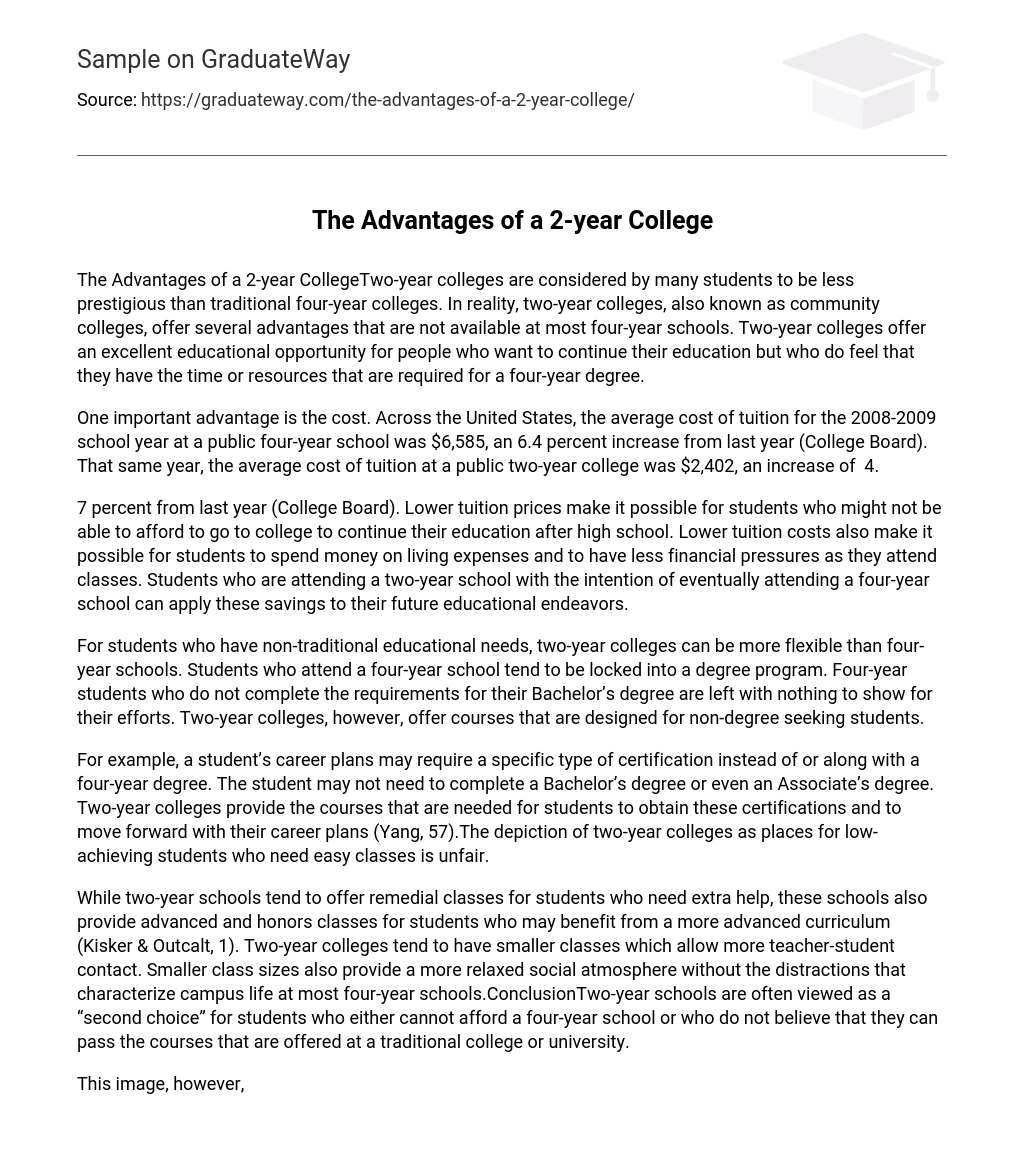The Advantages of a 2-year CollegeTwo-year colleges are considered by many students to be less prestigious than traditional four-year colleges. In reality, two-year colleges, also known as community colleges, offer several advantages that are not available at most four-year schools. Two-year colleges offer an excellent educational opportunity for people who want to continue their education but who do feel that they have the time or resources that are required for a four-year degree.
One important advantage is the cost. Across the United States, the average cost of tuition for the 2008-2009 school year at a public four-year school was $6,585, an 6.4 percent increase from last year (College Board). That same year, the average cost of tuition at a public two-year college was $2,402, an increase of 4.
7 percent from last year (College Board). Lower tuition prices make it possible for students who might not be able to afford to go to college to continue their education after high school. Lower tuition costs also make it possible for students to spend money on living expenses and to have less financial pressures as they attend classes. Students who are attending a two-year school with the intention of eventually attending a four-year school can apply these savings to their future educational endeavors.
For students who have non-traditional educational needs, two-year colleges can be more flexible than four-year schools. Students who attend a four-year school tend to be locked into a degree program. Four-year students who do not complete the requirements for their Bachelor’s degree are left with nothing to show for their efforts. Two-year colleges, however, offer courses that are designed for non-degree seeking students.
For example, a student’s career plans may require a specific type of certification instead of or along with a four-year degree. The student may not need to complete a Bachelor’s degree or even an Associate’s degree. Two-year colleges provide the courses that are needed for students to obtain these certifications and to move forward with their career plans (Yang, 57).The depiction of two-year colleges as places for low-achieving students who need easy classes is unfair.
While two-year schools tend to offer remedial classes for students who need extra help, these schools also provide advanced and honors classes for students who may benefit from a more advanced curriculum (Kisker & Outcalt, 1). Two-year colleges tend to have smaller classes which allow more teacher-student contact. Smaller class sizes also provide a more relaxed social atmosphere without the distractions that characterize campus life at most four-year schools.ConclusionTwo-year schools are often viewed as a “second choice” for students who either cannot afford a four-year school or who do not believe that they can pass the courses that are offered at a traditional college or university.
This image, however, is as unfair as it is inaccurate. Two-year schools provide a real educational opportunity for millions of students who might otherwise be unable to pursue their educational careers. As the cost of college tuition continues to increase, two-year schools can be expected to play an even more important role in providing educational services to all students, including older students, non-traditional students, minority students, and students who represent the first generation of students to attend college in their family. Most importantly, two-year colleges provide students with an opportunity for educational success that can change their lives forever.
Works CitedCollege Board. 2008-09 College Prices. 8 December 2008 <http://www.collegeboard.
com/student/pay/add-it-up/4494.html>Kisker, Carrie B., and Charles L. Outcalt.
“Community College Honors and Developmental Faculty: Characteristics, Practices, and Implications for Access and Educational Equity.” Community College Review 33.2 (2005): 1+. Questia.
8 Dec. 2008 <http://www.questia.com/PM.
qst?a=o&d=5013940636>.Yang, Po. “UCLA Community College Review: Reverse Transfer and Multiple Missions of Community Colleges.” Community College Review 33.
3-4 (2006): 55+. Questia. 8 Dec. 2008 <http://www.questia.com/PM.qst?a=o&d=5015322977>.





